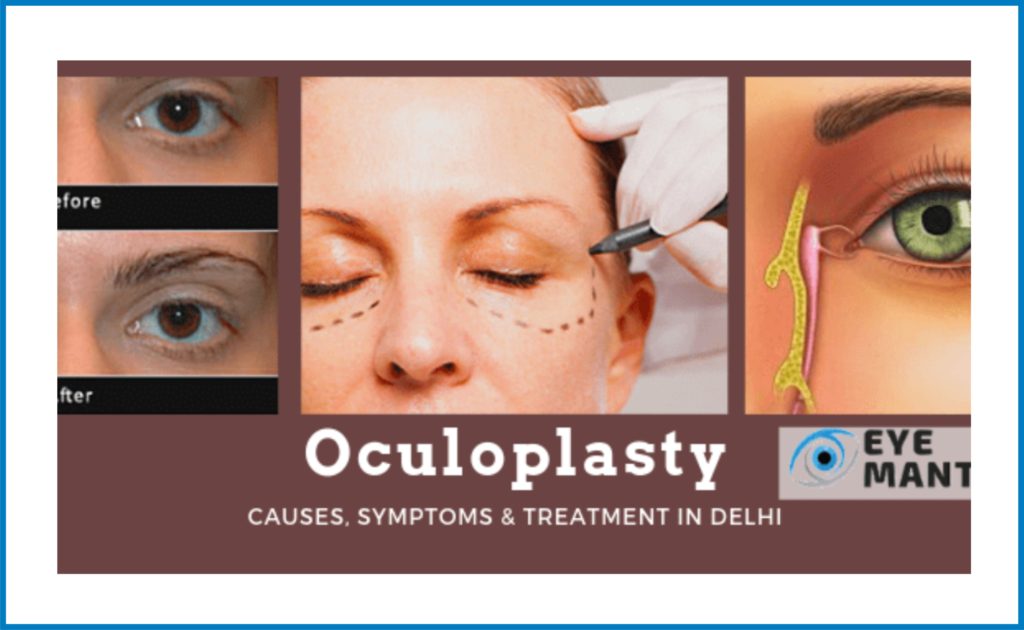Occuluoplasty Services
What is Oculoplasty?
Oculoplasty refers to plastic surgery procedures relating to the eyes and the structures surrounding the eyes. Such surgeries can be reconstructive (re-building) surgeries–to correct the abnormalities in the structure or cosmetic surgeries–to make yourself look more beautiful.
Oculoplasty is the area of Ophthalmology that treats conditions of the tissues that support the eye. These tissues include the upper and lower eyelids, eyebrows, the tear ducts and the bony structures of the orbit. The procedures performed include those that improve sight and function of the eye as well as cosmetic procedures that enhance appearance. The doctors at the Rajas Eye hospital have been doing Ophthalmic Plastic surgical procedures for over 20 years.
Aging, the environment and your health can all affect the appearance of your eyelids and skin.Droopy eyelids and wrinkles can add years to your face and may even block your vision. The solution might be closer than you think. Primary Eye Care has long been recognised as one of the area’s premiere eye care centres, providing a full spectrum of high-quality medical and surgical eye care services.
Reasons for Oculoplasty procedures :
Plastic surgeries could be done to treat following abnormalities commonly :
- Brow lifts in case of sagging eyebrows and to reduce forehead wrinkles
- To correct droopy eyelids due to abnormal muscle development, ageing or trauma in the eyes
- To control excessive tearing
- Swollen eyes due to infection, conditions of thyroids, etc.
- Wrinkle lessening
- Skin cancer reconstruction
- To correct the effects of an injury or previously done eye surgeries.
Oculoplasty surgery help you to get beautiful, healthy looking eyes which can definitely improve your over-all appearance and the quality of life.
Prevention of an eyelid surgery
Before we discuss on the methods of eyelid correction, prevention is always preferable than treatment. Drinking adequate amount of water, having a balanced meal including fiber and minerals, maintaining adequate and good pattern in sleeping, wearing good quality sunglasses, keeping your eyes clean and taking care of your environment are ways of preventing any surgeries to your eyes.
Ptosis surgery

Why Ptosis surgery?
This surgery corrects the problem of droopy eyelids. We have seen people having upper eyelid dropped down and this surgery can be performed on an eye or both eyes. This is a natural abnormality in some and this condition could arise with aging. Droopy eyelids can also result in a significant vision difficulty or eyelid swelling and appear cosmetically unappealing, making yourself less confident to walk in to the public.
Symptoms which require Ptosis surgery
Do not ignore if you have following symptoms. You may have been affected by droopy eyes.
- Heaviness in the eyelids
- Reduced vision
- Pain in forehead or headache due to eyestrain
- Constantly raising the eyebrows to lift the eyelid
How this surgery is performed?
This is a day care procedure. The oculoplasty surgeon will position the eyelid at the most appropriate level and the surgery will be performed after giving a local anesthesia to numb the area.
Before and after the surgery
- In order to minimize bleeding and avoid infections it is recommended not to use aspirin or other blood thinners.
- List all the medicines and vitamins you use to the doctor and discuss what should be stopped temporarily.
- Let your doctor know everything about allergies and long-term eye problems you have.
- After surgery, the doctor gives specific instructions depending on what ptosis surgery was done for you. Exactly follow all the instructions including antibiotics.
- Your doctor would arrange a follow up appointment at appropriate date to remove the stitches.
- Recovery time period is commonly one week although it varies person to person. Bruising and swelling would be present for at least another few weeks.
- The surgery will help to improve the vision if dropped eyelids were covering a major part of your eye, before the surgery.
- You may also have to alter your glasses or contact lenses as the surgery will change the shape of cornea slightly.
Complications
Possible complications can be listed as:
- Under correction (eyelids being positioned too low) or over correction (they being positioned too high)
- Infection
- Bleeding
- Excessive scars on the eyes and eye exposure
Some persons are recommended for an additional surgery to overcome any complication. Not all doctors can perform this surgery as it is a highly specialised surgery and choose an experienced surgeon.


